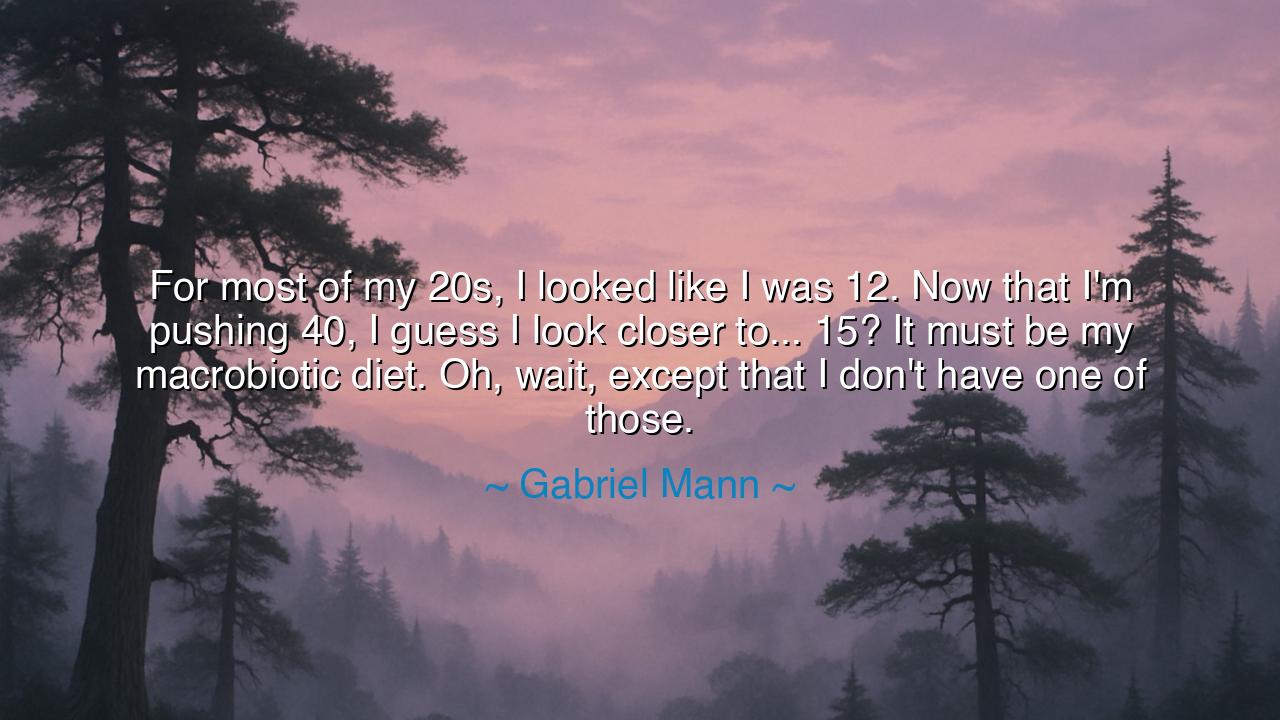
For most of my 20s, I looked like I was 12. Now that I'm pushing
For most of my 20s, I looked like I was 12. Now that I'm pushing 40, I guess I look closer to... 15? It must be my macrobiotic diet. Oh, wait, except that I don't have one of those.






In the playful words of Gabriel Mann, there hides a deeper reflection on the illusions of time and the freedom of self-acceptance: “For most of my 20s, I looked like I was 12. Now that I’m pushing 40, I guess I look closer to... 15? It must be my macrobiotic diet. Oh, wait, except that I don’t have one of those.” Beneath the jest and irony, this statement reveals a truth the ancients knew well—that youth and vitality are not born merely from what we eat, nor from the cosmetics or customs we follow, but from the spirit that dwells within. His humor is a mask for wisdom: that true youth is not measured in years or appearances, but in the ability to meet life with lightness, gratitude, and laughter.
When Mann jokes about the macrobiotic diet, he is invoking the modern world’s obsession with formulas for eternal youth—the endless search for perfection through control, through ritual, through diet. Yet he immediately undermines the notion by confessing that he has none at all. His words become a gentle mockery of the idea that one can purchase, plan, or consume their way to agelessness. The macrobiotic diet, born from philosophies of balance and harmony, once promised vitality through the careful pairing of foods. But Mann’s jest reminds us that no regimen, however sacred, can equal the power of joy, contentment, and self-acceptance. The light that keeps one young cannot be cooked, bottled, or sold—it must be lived.
The ancients, too, sought the secret to longevity, yet their greatest philosophers found the answer not in diet, but in the temper of the soul. Socrates, when asked how he remained so youthful in mind and spirit despite advancing age, replied that he never allowed bitterness or envy to take root within him. He fed, not upon the delicacies of the body, but upon the nourishment of thought, friendship, and curiosity. So it is with Mann’s humor—he reminds us that laughter itself is the most ancient and effective medicine, and that those who can laugh at themselves are never truly old. For time may carve its marks upon the face, but cynicism is what ages the soul.
His jest also reveals a rebellion against vanity. In a world where people fear aging as if it were a disease, Mann’s self-deprecating humor becomes a quiet act of defiance. He refuses to take his youth, or the loss of it, too seriously. This is a mark of wisdom, not folly. The Roman statesman Cicero, in his essay On Old Age, wrote that aging is not to be feared but to be embraced as the natural unfolding of life’s beauty. To resist it, he said, is to fight the tide of the ocean itself. Mann, in his lighthearted tone, echoes this truth. He accepts himself as he is, neither chasing youth nor lamenting its passing, and thus remains free—untouched by the anxieties that consume so many.
There is also in his words a quiet lesson on authenticity. By admitting that he follows no perfect system, no flawless regimen, he teaches that the pursuit of health and appearance should never eclipse the joy of living. The ancients called this aurea mediocritas—the “golden mean,” or the path of balance. To care for the body is wise, but to obsess over it is bondage. The one who lives moderately, who laughs easily, who rests when tired and works when inspired—such a person glows with the radiance that no cosmetic or diet can imitate. Mann’s mockery of perfection is, in truth, an embrace of the real, of the imperfections that make life beautiful.
Consider the story of Diogenes, the philosopher who lived in a barrel, scorning luxury and pretense. When asked what he sought in life, he said, “To find an honest man.” And when Alexander the Great offered him anything he wished, Diogenes simply replied, “Stand out of my sunlight.” His simplicity and humor disarmed kings, for he understood that freedom lies not in having more, but in needing less. Mann’s quip about youth and diet springs from that same eternal source. He asks for nothing, he boasts of nothing, and thus he possesses the greatest treasure of all—ease of spirit.
The lesson, then, is simple yet profound: Do not chase youth; live with lightness. Eat well, yes—but also laugh, forgive, and breathe deeply. Do not become enslaved by the pursuit of health or beauty, for the body will always change, but the heart can remain forever young. Cultivate humor in your struggles, grace in your aging, and gratitude in every passing year. For as the ancients taught, the soul that can laugh in the face of time will never grow old.
And so, let Gabriel Mann’s words remind us that the truest diet is not of food, but of thought and spirit. To live “lean” is to live free of resentment; to live “clean” is to live without deceit; to live “healthy” is to live with joy. This is the secret that neither herbs nor regimens can bestow—the secret that the wise have always known: that the fountain of youth flows not from the body, but from the soul that chooses to smile.






AAdministratorAdministrator
Welcome, honored guests. Please leave a comment, we will respond soon